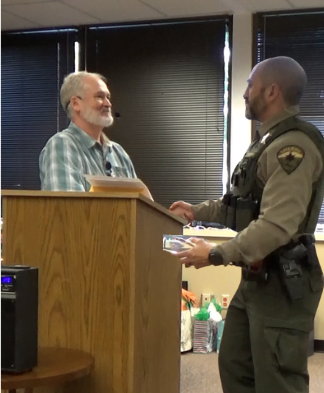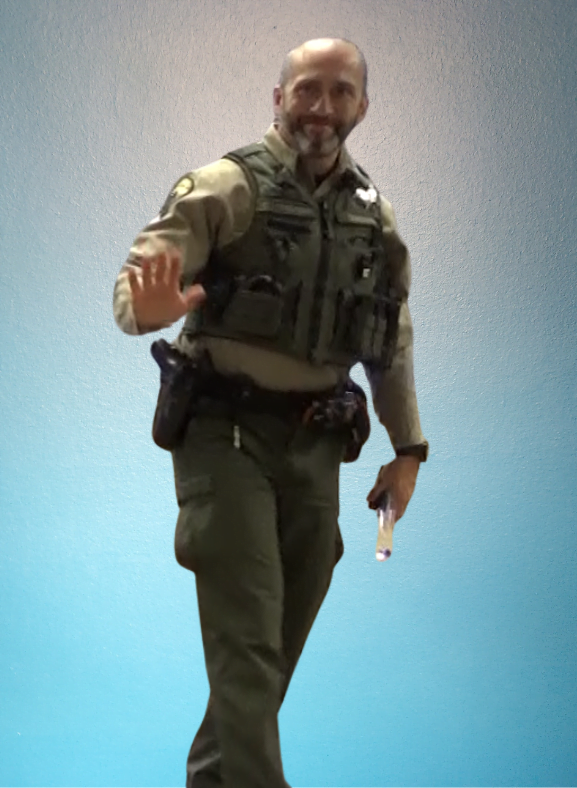Part 1: Deputy David Wolner
The WSTC Voices in Recovery award highlights those in the community who stand out for the work they do to help people who can’t always speak up for themselves. This year, WSTC honored Deputy David Wolner from the Kitsap County Sheriff’s Office.

The Nomination
The people who nominated David for Voices in Recovery call him kind and compassionate. They say it’s obvious from his actions that he genuinely cares for the people he serves. He’s committed to getting people the help they need, and then he follows up after the initial interaction to check on their well-being. He also makes himself available when the WSTC Recovery Empowerment Advocacy Linkage (REAL) Team has a safety concern with an encampment, and offers to go with them or check places out ahead of time.
A Healthy Community
About his role as law enforcement interacting with the homeless community, David says that he lives by two principles: accountability and compassion. Both are critical for ensuring a healthy community, just like they’re both essential for raising a healthy child. Either one, without the other, will result in issues because, as he points out, the health of the community isn’t a reflection of the people at the top, living on yachts. “It’s reflected by the people who are living at the bottom.”
Answers to the Right Questions
When he looks at solutions for the unhoused population, he believes they need to come from answers to questions such as, “How do we help them move up? How do we help them see solutions in themselves? How do we empower them to try to get out of that life if possible – if they have the capacity to do that?” His answer: “I strive to make this part of my daily approach because kicking people along, treating them poorly to get them to move out of the immediate area isn’t solving the long-term issues. It just creates bad relationships, which leads to less compliance and worse results overall down the road.”
A Matter of Trust
When asked what lessons he’s learned while serving this vulnerable group of people, David didn’t hesitate. “We’re all just human beings trying to survive.” That doesn’t mean he lets people off the hook when they break the law, though. “I’m going to keep holding people accountable for the crimes they commit. That’s just part of being a good steward.” But, he explains, it’s building up trust with people over the long-term, even when he has to hold them accountable for things like shoplifting, warrants they have, and so on, that helps them to realize that upholding the law isn’t personal. People know they can trust him.
“With the homeless population, what’s giving me inspiration is going out and building rapport with people, and then seeing their success through that rapport.”
Rapport = Success
In one example of success built on rapport, David was looking for an unhoused person with a felony warrant who was reportedly victimizing dozens of other unhoused people in the Silverdale area. Because he had built up trust with some people, they pointed him in the person’s direction, even though typically, they wouldn’t communicate with law enforcement.
“I was at a new encampment, and I happened to find him,” he says. “But unfortunately, I was by myself a the time, and he was in a tent with somebody else.” However, the other person turned out to be someone David had built a lot of rapport with over several months.
While dealing with the man with a warrant, a wrestling match ensued. The man called for his buddy to help him, but instead, the buddy got out of the tent and said he wasn’t going to mess with the cops. That was a good thing, but even so, David worried that his partners wouldn’t be able to find him out in the middle of the woods, and he worried about the man possibly having a weapon, and the situation escalating into something more dangerous.
Eventually, he did get the man under control, and his partners found him. Then he learned that the buddy had gone and flagged them down and told them how to find him. Not only that, but the man stayed to give a statement to the sergeant of what happened. In his statement, he said he believed the man should’ve just gone along with David and complied, but didn’t.
The next day, David went back and found the buddy and shook his hand and told him, “Listen, that could’ve gone so much differently if you hadn’t gotten involved. It could’ve gone badly for all of us. Thank you for making that choice.” He explains, “That choice that he made meant a lot to me, and it was reaffirming to me that the contacts we make with the people matter, and the rapport we build with them matters.”
The Reason Behind the Work
The benefits of that rapport affect the people David serves, too. Another of his favorite recent success stories involves a military veteran who struggles with mental illness and substance use disorders. He had gone to treatment after a tent fire scared him badly, but left early because he felt he needed to take care of some things, then started using again. “This is a guy who showed me his phone a little while back and said, ‘You’re on my emergency contact list.’ If he overdoses and someone finds his phone, they’re going to see my number first. It hurt my heart that he left treatment then because I want so much for him to succeed.”
David didn’t give up, though. Along with Jarrod Moran from the Homeless Encampment Action Response and Transitions (HEART) Program and the WSTC REAL Team, he tried again, suggesting that the veteran take an empty inpatient bed available at Kitsap Recovery Center. This time, the man said he needed to take care of his stuff, but he’d meet David the next day at 11 a.m. to go to treatment. “In my heart I thought, well, it’s not going to happen. But you know what? Hope for the best.” The gentleman gave him a hug and said he would be there, and David said OK, he’d take his word for it.
The next day, David waited at the meeting place, feeling that the chances of the veteran showing up were very low. But then at 10:57, he came walking out of the woods with a big smile on his face. “All right,” he said. “I’m ready. Let’s go.”
On the way to KRC, the gentleman said that he was happy his tent burned down. He recognized that he’d been using his stuff as an anchor to his old life, and it had been an excuse not to get treatment. Now he realizes that his health and getting into treatment are more important than his stuff.
“I walked him in and handed him over to the treatment center. He shook my hand and that to me is why we’re doing what we’re doing. To give people like him a chance to be healthy and get better.”
And it’s that compassion and commitment to the community is why WSTC has chosen to honor Deputy David Wolner with this year’s Voices in Recovery Award.


